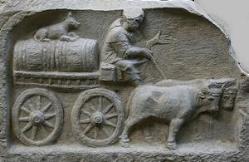- Originaltext: ... wie Sulzacker, hierher rechne ich ferner den Bruckacker 437, ehedem sehr sumpfig, daher m.E. zu "Bruch" = Moor ...
- Quelle Buck: Brühl, m. ahd. brogil, bruohil, mhd. bruogel, bruohel, bruehnel, ... In Oberschwaben hat fast jedes Dorf seinen Brühl. Dort versteht man darunter Wässerwiesen. Dies Wort auch in den rom. und kelt. Sprachen. In Italien brogilo, gäl. bruchal, brual in diesen Sprachen = eingefriedigtes Gehölz, Park.
- Quelle Eberl: Brod, Brog, s., Lehm; ahd. prod, mhd. prod = dicke Brühe. Bruch, m., s., ahd. bruoh, mhd. bruoch = Sumpf. Brühl, Priel, m., ahd. bruil, bruohil, mhd. bruel, mlat. brogilus - Sumpf, nasse Wiese
- Quelle www.tara.tcd.ie/bitstream/2262/3921/1/jssisiVolXII263_294.pdf
BRACK. -The word BRACK, in Irish breac, "speckled" or " spotted," enters into the composition of numerous Townland names, as Brackagh, breacach, "speckled place." The word breac also occurs in the Gaelic of Scotland, as Bennanbrack, " spotted hill" Galloway. It is the same in Manx, as Cronkbreck, " speckled hill." Compare Welsh brych
- Quelle www.pbenyon.plus.com/Misc/Etymology.html
Bro Celtic, a district; e.g. Pembroke.
- Querverweis, siehe dazu auch
 Brühl unter Ortsnamen
Brühl unter Ortsnamen
